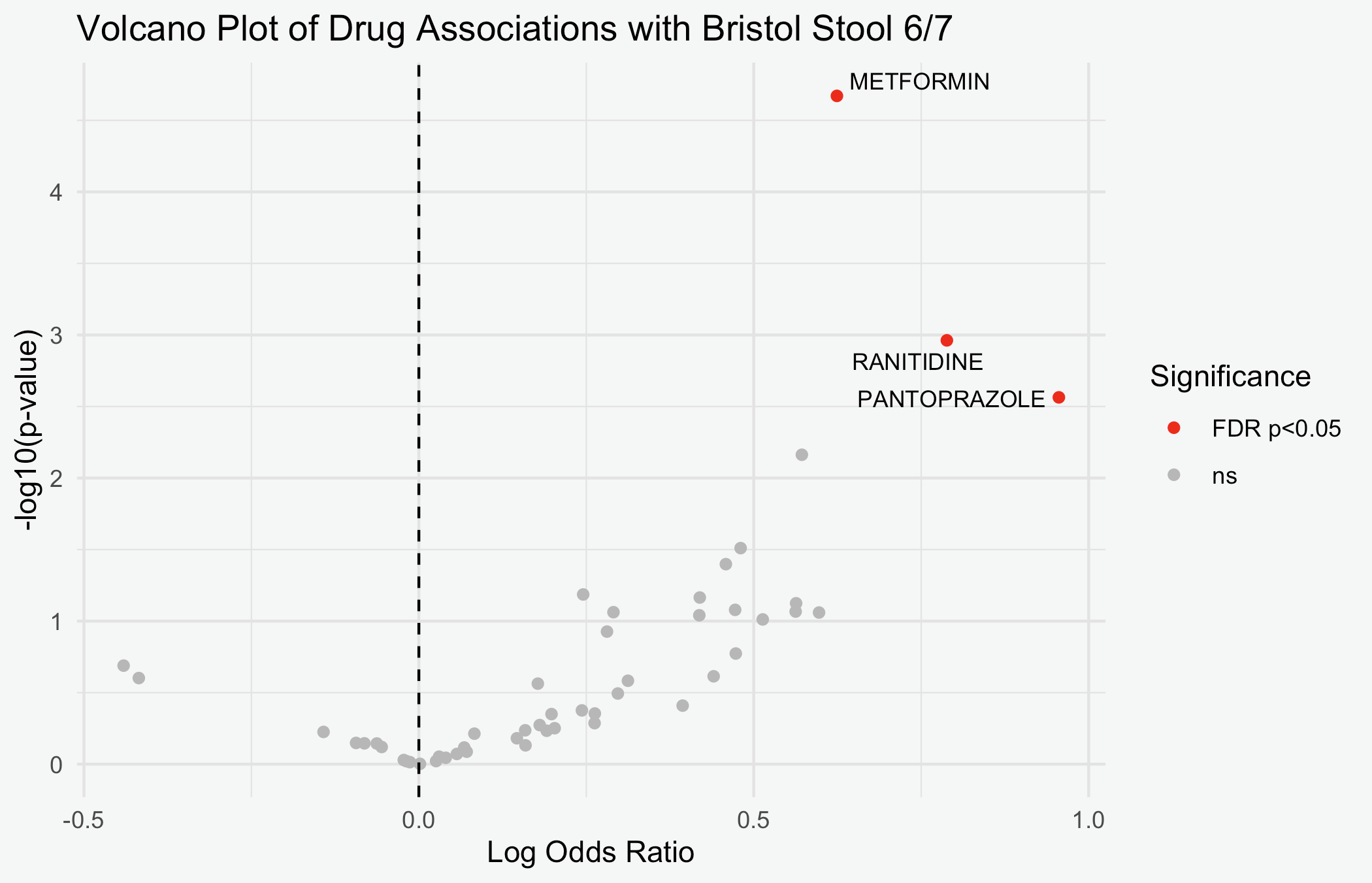Monday Poster Session
Category: Functional Bowel Disease
P2948 - Drug-Diarrhea Associations Among Common Prescription Medications: An Analysis of the 2005-2010 NHANES Data
Monday, October 27, 2025
10:30 AM - 4:00 PM PDT
Location: Exhibit Hall
- DM
Daniel Matloff, MD, MS (he/him/his)
University of Arizona College of Medicine
Tucson, AZ
Presenting Author(s)
Daniel Matloff, MD, MS1, William Matloff, MD, PhD2
1University of Arizona College of Medicine, Tucson, AZ; 2Banner - University of Arizona Tucson, Tucson, AZ
Introduction: In clinical trials of medications, diarrhea is a frequently reported adverse effect. However, exactly which medications are associated with an increased risk of diarrhea in the population with routine real-world use is understudied. A greater understanding of this risk may help clinicians identify medication-related contributors to diarrhea. In this study, we used a data-driven approach in a nationally representative data sample to investigate which commonly prescribed drugs are associated with diarrhea.
Methods: This study used the 2005-2010 cycles of the National Health and Nutrition Examination Survey (NHANES), which included the bowel health questionnaire. We investigated all medications that were taken by at least 200 participants. Diarrhea was defined based on the survey question regarding the most common stool type as a Bristol Stool Form Scale 6 or 7. For each of these medications, we used a survey-adjusted logistic regression model to test the association of that medication with diarrhea. We controlled for multiple comparisons using false-discovery rate adjustment.
Results: The final sample size was 13,722 participants. 50 medications were taken by at least 200 participants and included in the analysis. The estimated prevalence of diarrhea as defined by self-reported Bristol Stool Scale 6 or 7 was 6.6% (95% CI 6.1-7.1%). Three medications were found to have an FDR-adjusted p-value (q) less than 0.05: metformin, ranitidine, and pantoprazole. Metformin was associated with increased odds of diarrhea (OR 1.87, 95% CI 1.44-2.42, p=2.1e-5, q=1.1e-3). Similar associations were observed for ranitidine (OR 2.2, 95% CI 1.4-3.5, p=1.0e-3, q=0.027) and pantoprazole (OR 2.6, 95% CI 1.4-4.8, p=2.7e-3, q=0.046). Figure 1 shows a volcano plot of effect size and statistical significance for all 50 medications.
Discussion: In this study, we found that metformin, ranitidine, and pantoprazole were associated with diarrhea. While metformin and pantoprazole are known to frequently cause diarrhea, ranitidine, though now discontinued in the U.S., is less frequently recognized as a contributor to diarrhea risk, and corroborates that gastric acid reducing agents as a class may have a propensity for causing diarrhea. However, any causal interpretation of these findings is limited by confounding from medication indication. Future work will investigate how polypharmacy and drug interactions influence diarrhea risk.

Figure: A volcano plot of the association of commonly prescribed medications in the NHANES 2005-2010 with diarrhea, as defined by Bristol Stool Form 6 or 7
Disclosures:
Daniel Matloff indicated no relevant financial relationships.
William Matloff indicated no relevant financial relationships.
Daniel Matloff, MD, MS1, William Matloff, MD, PhD2. P2948 - Drug-Diarrhea Associations Among Common Prescription Medications: An Analysis of the 2005-2010 NHANES Data, ACG 2025 Annual Scientific Meeting Abstracts. Phoenix, AZ: American College of Gastroenterology.
1University of Arizona College of Medicine, Tucson, AZ; 2Banner - University of Arizona Tucson, Tucson, AZ
Introduction: In clinical trials of medications, diarrhea is a frequently reported adverse effect. However, exactly which medications are associated with an increased risk of diarrhea in the population with routine real-world use is understudied. A greater understanding of this risk may help clinicians identify medication-related contributors to diarrhea. In this study, we used a data-driven approach in a nationally representative data sample to investigate which commonly prescribed drugs are associated with diarrhea.
Methods: This study used the 2005-2010 cycles of the National Health and Nutrition Examination Survey (NHANES), which included the bowel health questionnaire. We investigated all medications that were taken by at least 200 participants. Diarrhea was defined based on the survey question regarding the most common stool type as a Bristol Stool Form Scale 6 or 7. For each of these medications, we used a survey-adjusted logistic regression model to test the association of that medication with diarrhea. We controlled for multiple comparisons using false-discovery rate adjustment.
Results: The final sample size was 13,722 participants. 50 medications were taken by at least 200 participants and included in the analysis. The estimated prevalence of diarrhea as defined by self-reported Bristol Stool Scale 6 or 7 was 6.6% (95% CI 6.1-7.1%). Three medications were found to have an FDR-adjusted p-value (q) less than 0.05: metformin, ranitidine, and pantoprazole. Metformin was associated with increased odds of diarrhea (OR 1.87, 95% CI 1.44-2.42, p=2.1e-5, q=1.1e-3). Similar associations were observed for ranitidine (OR 2.2, 95% CI 1.4-3.5, p=1.0e-3, q=0.027) and pantoprazole (OR 2.6, 95% CI 1.4-4.8, p=2.7e-3, q=0.046). Figure 1 shows a volcano plot of effect size and statistical significance for all 50 medications.
Discussion: In this study, we found that metformin, ranitidine, and pantoprazole were associated with diarrhea. While metformin and pantoprazole are known to frequently cause diarrhea, ranitidine, though now discontinued in the U.S., is less frequently recognized as a contributor to diarrhea risk, and corroborates that gastric acid reducing agents as a class may have a propensity for causing diarrhea. However, any causal interpretation of these findings is limited by confounding from medication indication. Future work will investigate how polypharmacy and drug interactions influence diarrhea risk.

Figure: A volcano plot of the association of commonly prescribed medications in the NHANES 2005-2010 with diarrhea, as defined by Bristol Stool Form 6 or 7
Disclosures:
Daniel Matloff indicated no relevant financial relationships.
William Matloff indicated no relevant financial relationships.
Daniel Matloff, MD, MS1, William Matloff, MD, PhD2. P2948 - Drug-Diarrhea Associations Among Common Prescription Medications: An Analysis of the 2005-2010 NHANES Data, ACG 2025 Annual Scientific Meeting Abstracts. Phoenix, AZ: American College of Gastroenterology.
